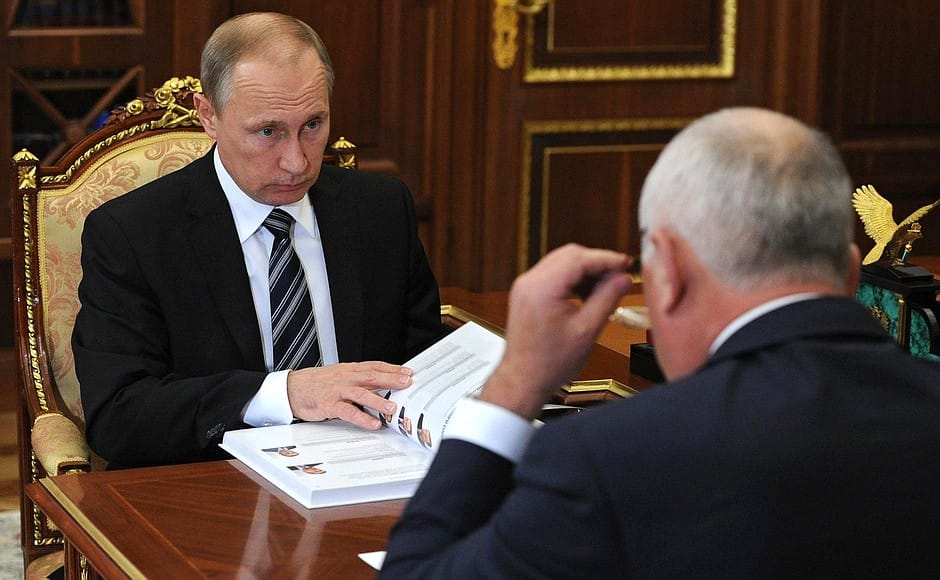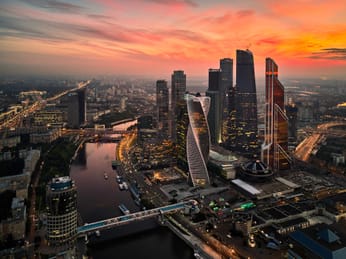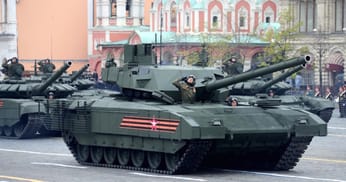
THE BELL WEEKLY: How Putin's friend cleans up Russian media space
Hello! This week our top story is about how Vladimir Putin's old friend, the influential head of state conglomerate Rostec Sergei Chemezov wages a war on Telegram, a messaging app which has become the most influential social network in Russia. We also look at a “leaked” audio of Russian elites slamming the Kremlin, the coverage of Xi Jinping's visit to Moscow by the propaganda, and at Dmitry Medvedev reinventing himself as a Stalinist.
Comment Rostec a nettoyé les canaux anonymes de Telegram - une enquête menée conjointement par The Bell et Meduza
Depuis un an, l'entreprise publique russe Rostec mène une guerre sur deux fronts. Outre la fourniture d'armes à l'armée russe, elle se bat également pour débarrasser Telegram de toute critique à l'encontre de son dirigeant, Sergei Chemezov, de son ancien responsable des relations publiques, Vasily Brovko, et de sa femme Tina Kandelaki. Il n'est pas facile de passer inaperçu aux yeux de Rostec, qui dispose d'un logiciel capable d'identifier les personnes qui se cachent derrière les canaux anonymes. Svetlana Reiter, de Meduza, et Irina Pankratova, de The Bell, expliquent comment Rostec a réussi à mettre au pas la communauté russe de Telegram.
Vous pouvez lire l'intégralité de l'enquête en russe ici.
- Vasily Brovko, ancien responsable des relations publiques de Rostec et actuel "directeur des missions spéciales", mène la charge contre les canaux Telegram anonymes. Officiellement, M. Brovko a supervisé des dizaines de projets, de la création d'un programme d'enseignement numérique unifié en Russie à l'introduction de la 5G dans tout le pays. Cependant, son véritable travail consiste à diriger la politique d'information de Rostec : "Aujourd'hui, Chemezov ordonne à Brovko de surveiller toutes les chaînes Telegram qui écrivent un seul mot sur Rostec. Il fait cela depuis que Telegram est arrivé en Russie", a déclaré une connaissance de longue date du chef de la société d'État.
- Il n'est pas facile de déterminer exactement quels canaux Telegram "servent" Rostec. Cependant, nous pouvons voir quelles sont les chaînes qui écrivent le plus souvent sur l'entreprise et ses dirigeants. L'une de ces chaînes, Nezygar, est une pionnière du contenu politique anonyme avec des liens vers des "initiés" non identifiés.
- Ceux qui diffusent des informations préjudiciables sur les cadres supérieurs de Rostec sont poursuivis devant les tribunaux. Les employés ayant une expérience au sein du FSB sont utilisés pour arrêter les administrateurs de canaux anonymes. Par exemple, en septembre 2022, Anatoly Spirin, un blogueur de 26 ans originaire d'Ulyanovsk, a été arrêté pour "extorsion". Spirin dirigeait des chaînes anonymes peu médiatisées, telles que Politburo 3.0, où il publiait des comptes rendus cinglants sur les hommes politiques et les hommes d'affaires locaux.
- Une autre affaire très médiatisée a vu l'arrestation de journalistes qui dirigeaient une chaîne anonyme sur la vie sociale. La productrice de la chaîne était Ksenia Sobchak, célèbre journaliste russe et ancienne candidate à la présidence. La chaîne a rapporté que M. Chemezov avait assisté à la fête d'anniversaire du magnat du charbon Andrei Bokarev. M. Brovko a vu le message et l'a signalé à son patron. En temps de paix, on pouvait l'ignorer, mais aujourd'hui, alors que "la patrie est en danger", même des informations insignifiantes comme qui a assisté à quelle fête d'anniversaire deviennent indésirables", a déclaré le créateur d'une chaîne Telegram russe très populaire.
- Quatre propriétaires de canaux Telegram qui ont parlé à nos enquêteurs sont convaincus que l'intérêt de Rostec pour Telegram, qui s'est intensifié après l'invasion de l'Ukraine, est inspiré par le désir de "rétablir l'ordre et de prendre tous les canaux sous contrôle".
Pourquoi le monde devrait s'en préoccuper :
La Russie a bloqué de nombreux réseaux sociaux occidentaux populaires depuis qu'elle a lancé son invasion à grande échelle de l'Ukraine. Alors que l'espace médiatique s'est réduit, le nombre d'utilisateurs de Telegram qui suivent des canaux anonymes a augmenté. Aujourd'hui, le gouvernement russe semble prêt à nettoyer ces sources d'information par l'intermédiaire de Rostec.
“Leaked” audio of Russian elites slamming the Kremlin makes a splash on social media
Unexpectedly, the hot news item over the weekend was the leak of what appears to be a half-hour telephone conversation between Iosif Prigozhin, a famous music producer and Putin’s confidante during the last presidential elections, and Farkhad Akhmedov, a businessman and former senator. The pair sharply criticized Russian authorities over the war in Ukraine (the Russian word for “fuck” is heard 157 times) and complain about how hard it is to live with sanctions.
- The recording first appeared on social media two weeks ago, circulated by a pro-Ukrainian group. Akhmedov has yet to comment, and Prigozhin denounced the recording as a fake, arguing that “everyone knows” his position. “Today’s technology, with its neural networks, allows you to fake not just a voice but a whole conversation,” the producer said. However, he later clarified that “certain moments” of the recording were real, although he claimed not to remember there being any criticism of Putin.
- Wagner Group boss Yevgeny Prigozhin, who shares the music producers’ surname, reacted to the clip by saying it was “possible that the people who set up this ‘special operation’ and posted this conversation believe that it’s me talking.”
- The voice alleged to be Akhmedov’s repeatedly says that the Russian authorities “pissed everyone off,” by launching the war in Ukraine, “crapped themselves” and “plundered the whole country.” The voice believed to be Iosif Prigozhin repeatedly agrees with him. Akhmedov complains he lost his yacht due to sanctions and advises his friend to sell anything that could fall under similar restrictions.
- After Russia invaded Ukraine, Akhmedov was sanctioned by the EU for his businesses “in sectors of the economy that provide significant sources of income for the Russian government.” He is currently ranked 49 on the Forbes list of the richest Russian businessmen after making a fortune in oil and gas companies. Between 2004 and 2009, he served as a senator in the upper house of Russia’s parliament.
Pourquoi le monde devrait s'en préoccuper :
We don’t know – and probably never will – whether the recording is genuine. Prigozhin himself didn’t specify which fragments were real. In theory, artificially generating this kind of conversation is possible using neural network technology. Nevertheless, whenever snatches of private conversation between members of Russia’s elites emerge, they attract enormous interest.
Russian state propaganda hails Xi’s visit to Moscow
Last week, Chinese President Xi Jinping traveled to Moscow, where he spent two days with Russian President Vladimir Putin. Russian state propaganda hailed Xi’s visit as a sign that Russia and China are uniting in opposition to American hegemony. However, the two parties didn’t sign any important new agreements, and if there were any deals on supplying weapons, then they happened behind closed doors.
- After their meetings, Putin and Xi signed documents on advancing Russian-Chinese relations, comprehensive partnerships, and strategic interaction, plus a joint statement on developing economic collaboration through 2030. Besides that, both sides promised “to defend the norms of international relations based on the UN Charter.”
- Xi and Putin also spoke about the war in Ukraine. Xi mentioned “peace proposals” that China published a month ago (they boil down to an immediate ceasefire on undefined terms, and are clearly unworkable) and said that China “always stands for peace and dialogue, and stands firmly on the right side of history.” Putin said that “many of the provisions” of China’s plan “could be taken as the basis for a peaceful settlement” but neither Kyiv nor the West was ready for the plan.
- Xi’s arrival received the undivided attention of Russian state media. Rossiiskaya Gazeta published an article attributed to the Chinese president (in turn, China’s Renmin Ribao published a similar article from Putin). On talk shows, invited Russian experts explained how the friendship between Moscow and Beijing was a blow to the American economy, which depends on Chinese products, and added that “Xi Jinping is jumping into the trenches” with Putin. The propagandists also touched on the ICC arrest warrant for the Russian president, issued just before Xi’s trip. According to them, it was the “verdict of a kangaroo court” intended to deflect from Xi’s visit.
- Meanwhile, Russian state news agencies published opinion pieces by political analysts who insisted that Xi’s visit spelled “the end of the uni-polar era and the dawn of a multipolar world” despite “America’s fierce opposition to it.” They added that the west was “terrified” of the Chinese leader’s visit to Moscow.
- The Bell discussed Xi’s visit to Moscow with one of the most authoritative experts on China, Alexander Gabuyev, a senior fellow at the Carnegie Endowment for Peace. According to him, Russia is important to China as a junior partner in its ongoing conflict with the West. Russia can share modern weapons systems and sell natural resources cheaply. At the same time, China is unlikely to supply weapons or ammunition to Russia — Beijing does not care which flag flies over Bakhmut, where fierce battles have raged in recent months. The only thing that matters to China is that Russia does not lose the war and Putin’s regime does not collapse, potentially bringing a democratic government to power that might be hostile to China.
Pourquoi le monde devrait s'en préoccuper :
Most important for the Kremlin is that Xi’s visit took place. China showed that it will not turn away from Russia, and that this is a fundamentally significant partnership for Beijing despite Washington’s efforts to isolate Moscow, Gabuyev said. But it’s unlikely that ordinary Russians will gain anything from the relationship. Russia’s economic dependence on China is growing, and now Beijing can dictate the terms of its economic ties with Russia while the West refuses to do business with Moscow.
Former president Medvedev, once a critic of Stalin, now uses his speeches to motivate factory directors
Former Russian president Dmitry Medvedev, who devoted his presidency to promoting civil and economic freedoms, has reinvented himself as one of Russia’s main war hawks. This week, he invoked Stalin’s spirit to motivate directors of factories producing equipment for the military to work harder. Interestingly, just 13 years ago Medvedev called the former Soviet leader a criminal.
- Medvedev spoke at a meeting of the working group of the Military-Industrial Commission, which is responsible for delivering Russian defense policy. He said that he “couldn’t help drawing the attention” of directors of military factories to the way “this work” was evaluated in “a similar situation,” referring to World War II. To cheer up those in attendance at the meeting, he read a telegram that Stalin sent one factory director in 1941 asking him to supply much-needed tank hulls on time, and threatened to crush him “as a criminal who neglects the honor and interests of his motherland” should he fail. Muzrukov clearly didn’t, and went on to become a key figure in the Soviet Union’s nuclear program.
- Medvedev said that Stalin’s telegram was proof that “no production, no organization is perfect" and suggested factory directors remember the Soviet leader’s words. When asked about Medvedev’s quoting of Stalin, the Kremlin replied that “we need to draw on all experience.”
- During Medvedev’s presidency from 2008 to 2012, he sharply criticized Stalin and called him a criminal due to the Great Terror. “To this day, you can hear how the vast number of victims was justified by some higher state goals. I am convinced that no development of the country, none of its success or ambition, can be achieved at the cost of human grief and loss,” Medvedev said in 2009.
- During World War II, Stalin often sent similar telegrams to the directors of Soviet military factories. In December 1941, he accused the directors of aircraft factories of “letting down the country and our Red Army.” In October of the same year, Stalin demanded that a shipyard in Nizhny Novgorod switch to producing tanks. The plant could not produce the required equipment fast enough, and its director, Dmitry Mikhalev, was fired and placed on trial. No trial ever took place, but Mikhalev didn’t return to his job.
Pourquoi le monde devrait s'en préoccuper :
Since Moscow launched its invasion of Ukraine, Russia’s leaders and propagandists have regularly drawn on the events of World War II, referring constantly, for example, to Ukrainian soldiers being “Nazis” and suggesting that Ukraine’s president will suffer the same fate as Adolf Hitler. With that in mind, it’s hardly surprising that Medvedev would quote from one of Stalin’s telegrams.









